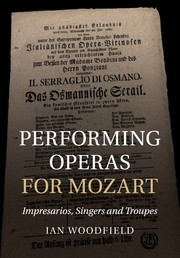Book contents
- Frontmatter
- Contents
- Illustrations
- Figures
- Tables
- Musical examples
- Abbreviations
- Introduction
- 1 Pasquale Bondini
- 2 Die Entführung aus dem Serail
- 3 The Italian troupe in Prague
- 4 The Prague Figaro
- 5 The genesis of Don Giovanni
- 6 The première of Don Giovanni
- 7 The casting of Don Giovanni
- 8 The Leipzig Don Giovanni
- 9 The 1788 Prague Don Giovanni
- 10 Mozart’s music in Leipzig
- 11 Josepha Duschek’s academy (22 April 1788)
- 12 Mozart’s academy (12 May 1789)
- 13 Guardasoni in Warsaw
- 14 The première of La clemenza di Tito
- 15 The Leipzig reception of the Da Ponte operas (1792–1794)
- 16 Guardasoni diversifies
- Conclusion
- Appendices
- Bibliography
- Index
- References
16 - Guardasoni diversifies
Published online by Cambridge University Press: 05 January 2012
- Frontmatter
- Contents
- Illustrations
- Figures
- Tables
- Musical examples
- Abbreviations
- Introduction
- 1 Pasquale Bondini
- 2 Die Entführung aus dem Serail
- 3 The Italian troupe in Prague
- 4 The Prague Figaro
- 5 The genesis of Don Giovanni
- 6 The première of Don Giovanni
- 7 The casting of Don Giovanni
- 8 The Leipzig Don Giovanni
- 9 The 1788 Prague Don Giovanni
- 10 Mozart’s music in Leipzig
- 11 Josepha Duschek’s academy (22 April 1788)
- 12 Mozart’s academy (12 May 1789)
- 13 Guardasoni in Warsaw
- 14 The première of La clemenza di Tito
- 15 The Leipzig reception of the Da Ponte operas (1792–1794)
- 16 Guardasoni diversifies
- Conclusion
- Appendices
- Bibliography
- Index
- References
Summary
Even at this undoubted high point, one critic at least was sounding an unmistakable note of concern over the future of Guardasoni’s chosen genre. In December 1794, a very downbeat appraisal of the prospects for Italian opera in Prague appeared in the Brno Allgemeines Europäisches Journal. The main article ‘Einige Nachrichten über den Zustand des Theaters in Prag’ was followed by a less well-known continuation ‘Fortsetzung der Nachrichten über das Theater zu Prag’. The latter provides a commentary on German theatre, but the two parts should be read together. The review is often attributed to Niemetschek, but the first instalment is only signed ‘***k’, which hardly allows for a firm identification of a Czech surname. According to Volek, the continuation was signed ‘N**k’, which again is not conclusive. Given that Niemetschek took up an appointment in Prague in the autumn of 1793, it is certainly possible that he would have been sufficiently well informed about the state of opera in the city to have written the piece. Yet the sharp tone of the critique differs radically from the warmth of his biography, even though some of the themes are recognisably the same. While it is certainly possible that a writer might adopt a markedly different tone in signed and unsigned pieces, the authorship of the article must remain an open question. Whoever he was, this critic was deeply worried about the state of Italian opera in Prague. He contrasts the current level of support – boxes left unsubscribed or shared between families – with former years in which the music-loving nature of the Bohemian public was most evident. He attributes the decline of Italian opera not just to management failings on the part of Guardasoni and the poor calibre of his singers – a common gripe – but to a fundamental change in the taste of the Prague audience itself. More and more, he complains, they are being seduced by Singspiel productions. Writing with heavy irony, he notes that thanks to the popularity of works such as Zauberzyther and Das Sonntagskind, the public is steadily losing its once correct and respectable taste, in favour of the refined feeling of the aforementioned masterpieces of music and wit from the Fatherland (Vienna and Italy). Yet its taste has not become so corrupt that it has lost all liking for true beauty and greatness. Why then, the critic wonders, does not Guardasoni nourish what remains of it with respectable fare? A nationalist antipathy to the imperial capital (‘Hauptstadt’) is manifest. On the other hand, in his biography Niemetschek is fair to Vienna, for all that he takes justifiable pride in the supportive attitude of his home city towards Mozart. Harsh criticism of the cabals and conspiracies of the Italian singers in the Court Theatre aside, he is even-handed in his approach, noting the difficulties Mozart had with the expensive Viennese lifestyle, but acknowledging his successes there, such as Die Entführung and the piano concertos, and reporting both his immediate failure to win a court position (blamed on his unworldly nature rather than any institutional hostility) and his eventual success. There is a brief allusion to the supposed decline in Prague taste, but only in a footnote.
- Type
- Chapter
- Information
- Performing Operas for MozartImpresarios, Singers and Troupes, pp. 189 - 216Publisher: Cambridge University PressPrint publication year: 2011

